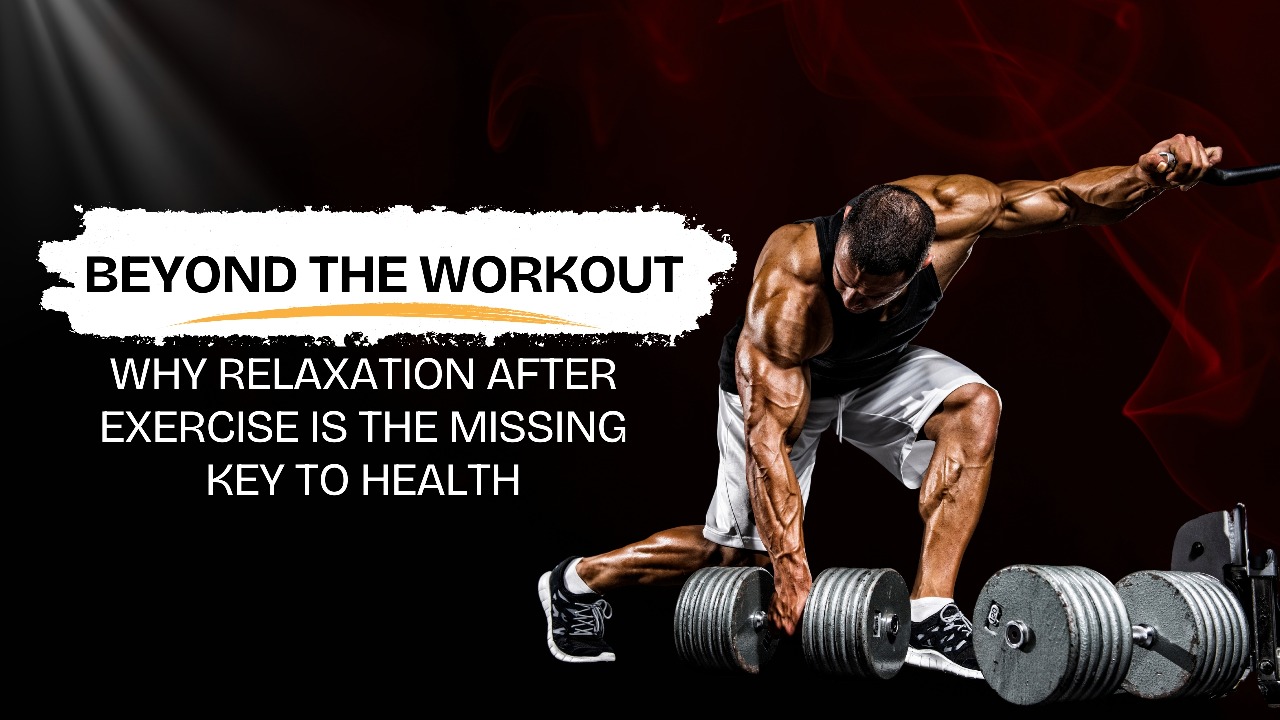Most people know that exercise is good for health. We hit the gym, go for runs, or roll out a yoga mat to boost fitness, burn calories, and stay strong.
But here’s a truth that often goes unnoticed:
The magic of exercise doesn’t end when you stop moving. It happens when you allow your body to relax afterward.
Science is showing that relaxation after physical activity isn’t optional, it’s essential for health, balance, and even weight loss.
🧠 Exercise Is Healthy Stress – But Stress Nonetheless
When you work out, your body experiences what scientists call a hormetic stress, a small, beneficial challenge that pushes it to adapt.
- Your heart races and your blood pressure rises.
- Stress hormones like cortisol and adrenaline spike, fueling performance.
- Muscles generate lactic acid and oxidative stress, signals that push cells to grow stronger.
This stress is good, but only if it’s followed by recovery. Without it, the body lingers in “fight-or-flight” mode, and the benefits of exercise may be blunted.
🌿 Relaxation: The Forgotten Half of Fitness
Research has found that relaxation practices, as simple as 10 minutes of mindful breathing, can flip the switch from stress to recovery. Here’s what happens:
- Parasympathetic rebound: Heart rate and breathing normalize faster, a sign your body is shifting into healing mode.
- Cortisol control: Relaxation lowers stress hormones, preventing stubborn fat storage, especially around the belly.
- Cellular reset: Studies show the relaxation response upregulates genes for energy metabolism and mitochondrial health while downregulating inflammation.
- Improved weight loss: Clinical trials reveal that adding relaxation techniques like meditation or guided breathing to diet and exercise plans leads to greater reductions in weight and waist circumference.
- Gut – brain harmony: Relaxation supports vagal tone, improving digestion, nutrient absorption, and even microbiome balance, a hidden factor in weight and mood regulation.
- Better sleep rhythm: Post-exercise relaxation helps align circadian rhythm, promoting deeper sleep. Quality sleep, in turn, regulates appetite hormones and enhances fat metabolism.
👉 In other words: without relaxation, exercise may give you sweat but not full recovery.
⚖️ Why Some People Don’t Lose Weight from Exercise Alone?
Ever wonder why some people work out consistently but the scale doesn’t budge? Science suggests stress may be the missing link.
- High cortisol can block fat burning and encourage fat storage.
- Stress and anxiety often lead to emotional eating and cravings.
- A stressed body may hold onto weight as if preparing for survival.
Some studies, suggest that individuals who added meditation or relaxation lost significantly more weight compared to those focusing only on diet and exercise.
So, for some, the secret to weight loss isn’t more reps, it’s more relaxation.
🔍 Overlooked Concepts That Matter
- The Autonomic Balance Factor:
Exercise powers up the sympathetic system; relaxation restores the parasympathetic. Skipping this balance can leave the body “stuck in gear,” increasing risk of burnout and inflammation. - Gene-Level Shifts with Relaxation:
The relaxation response literally reprograms your biology – enhancing energy efficiency, insulin sensitivity, and immune function. Exercise without relaxation misses out on this molecular benefit. - Relaxation and Gut Health:
Stress post‑workout can affect gastric motility and the microbiome. Relaxation enhances vagal activity, improving digestion and metabolic balance. - Sleep as Recovery:
Relaxation helps align circadian rhythms. Poor sleep raises hunger hormones (ghrelin) and lowers satiety hormones (leptin), sabotaging weight control.
Good sleep is one of the most powerful recovery tools. Studies showed that physical activity improves sleep quality, and in turn, quality sleep enhances metabolic regulation and recovery.
Without proper relaxation leading into restful sleep, exercise benefits may be blunted.
- Weight Loss Plateaus and Stress:
Sometimes the plateau isn’t diet or exercise – it’s stress. Relaxation breaks the cycle of cortisol-driven fat retention. - Relaxation Lowers Inflammation:
Chronic low‑grade inflammation is a hidden barrier to weight management and healthy ageing.Studies show that mindfulness meditation reduces inflammatory markers and enhances immune function.This suggests relaxation after exercise may help your body not only recover but also prevent long‑term metabolic dysfunction.
🧘 How to Unlock the Full Benefits of Your Workout
After your next exercise session, try one of these evidence-backed practices:
- Deep Breathing (5–10 min): Inhale deeply through your nose, exhale slowly through your mouth.
- Progressive Muscle Relaxation: Tense and release each muscle group, signaling the body to let go.
- Mindful Stretching or Yoga Nidra: Combine gentle stretches with breath awareness.
- Guided Meditation or Visualization: Use an app or audio track to calm the mind.
- Quiet Rest: Simply lying down and focusing on the breath can work wonders.
Think of this as your post-exercise prescription, as vital as the workout itself.
🌎 The Takeaway
Exercise builds strength, but relaxation locks in the gains. It’s the reset button that restores homeostasis, balances hormones, and ensures your effort translates into real health benefits.
“Skipping relaxation after exercise is like saving money but never letting it earn interest.”
So next time you finish your workout, don’t dash off. Take a few minutes to breathe, stretch, or simply rest. Your body isn’t asking for laziness, it’s asking for balance.
Because true fitness isn’t just about how hard you move.
It’s about how well you recover.

Written by Dr Yadhushree P V

